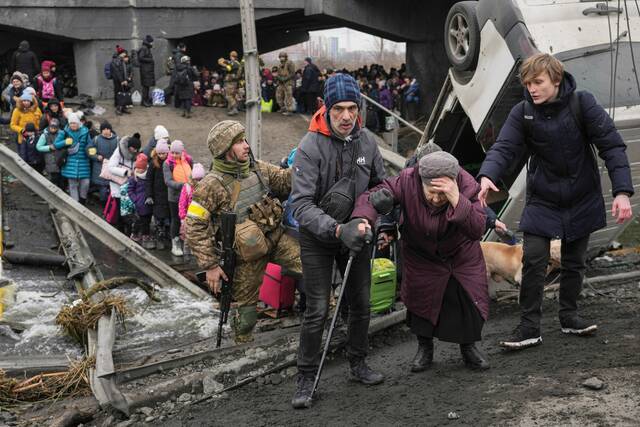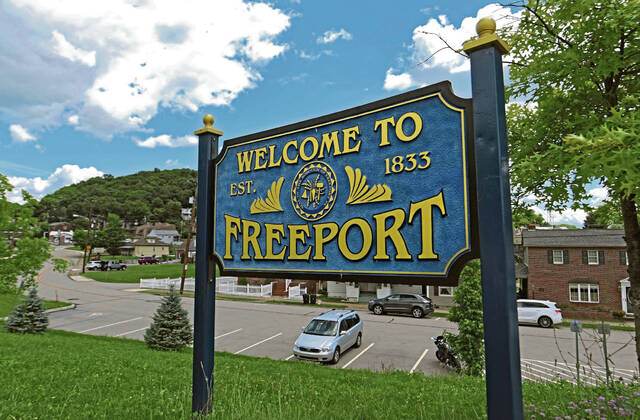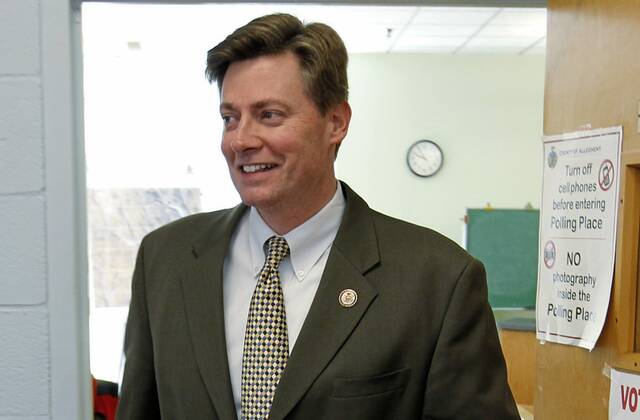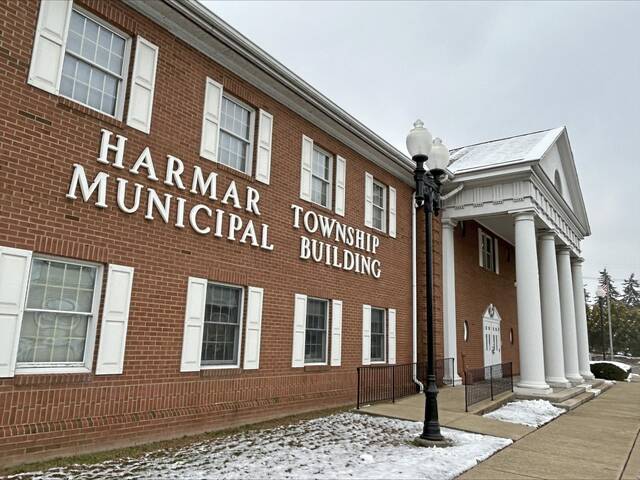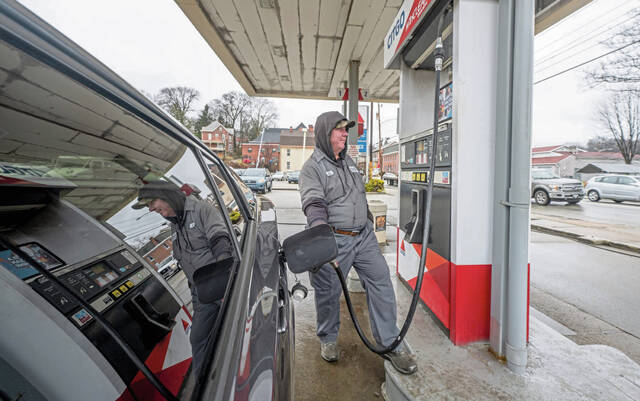As the world watches Ukrainian soldiers and citizens fight off a brutal and bloody invasion by Russia, scholars at the University of Pittsburgh are providing answers to what’s behind Ukraine’s feisty resistance and more.
Pitt’s Center for Russian, East European and Eurasian Studies, with nearly 90 affiliated faculty members, will present “The Russian War on Ukraine in Historical Context” from 5 to 6:30 p.m. March 15 in the Cathedral of Learning, 35th floor. The event is free to the public, who can register in advance to view the presentation online via Zoom.
Ahead of the event, the Tribune-Review surveyed faculty members for analysis of key factors.
“It’s no surprise that Ukrainian statehood has not collapsed in the face of Russia’s attempted blitzkrieg, as the Kremlin evidently expected it to,” said Trevor Erlacher, Pitt’s program coordinator and editor for the Association for Slavic, East European and Eurasian Studies. Erlacher is also the author of “Ukrainian Nationalism in the Age of Extremes,” published last year by Harvard University Press.
For Ukrainians, defeat is not an option, given its history of battering by conquering armies and a totalitarian state in the past century, he said.
“They remember the famine-genocide of 1932-33, Stalin’s terror and the Nazi occupation, each of which shattered the lives of millions in Ukraine,” Erlacher said.
If overtaken by Russia now, Ukraine is looking at a violent suppression of its national identity, democracy and right to self-determination, he said.
For centuries, Ukraine has struggled for independence, contributing to the creation, achievements and dissolution of the Soviet Union, Erlacher noted.
“Everything is on the line for Ukrainians,” he said. “For their sake and the world’s, the Kremlin’s neocolonial war must not be allowed to succeed.”
Russian President Vladimir Putin’s ambition is to reverse the last century of imperial decay by “destroying Ukraine as an independent nation and reassimilating it into the so-called ‘Russian world,’ ” Erlacher said.
History of Russian point of view explained
In his Feb. 24 speech and in other statements, Putin asserted Russia’s war aims with terms that elicited both horror and incredulity across the world: “We will seek to demilitarize and denazify Ukraine.” These allegations have deep roots.
Most of Ukraine’s territories were under the rule of the Russian empire’s expansion by the end of the 18th century and remained until the Russian Revolution in 1917, said Alissa Klots, assistant professor in Pitt’s Department of History.
Ukrainians, except for those who lived in the most Western territories, became Soviet citizens.
Ukraine was important to the Soviets because of its fertile soil and mineral reserves, including coal. “The concern about Ukraine was also a manifestation of the Bolsheviks’ siege mentality: the Soviet Union was surrounded by hostile capitalist powers that sought to destroy it,” Klots said. “So the Soviet leadership was always anxious about keeping Ukraine in the union and combating Ukrainian nationalism.
“During World War II, Ukraine was the site of immense bloodshed, but it also created an opportunity for Ukrainian nationalists to create paramilitary organizations that sought to establish an independent Ukrainian state,” Klots said. “In order to achieve that goal, they allied with Nazi Germany. After the war, the Soviets actively sought out and persecuted former members of the paramilitary organizations as Nazi collaborators.”
Related
• Ukrainian traditions, roots abound in Westmoreland County• Penn Hills man's Ukrainian family has history of resisting Russian invasions
• Ukrainian immigrants have become part of fabric of Western Pa.
• Western Pennsylvanians from Ukraine tell their stories
• More on Russia's war on Ukraine
Ukraine’s history is important in shaping Russian-Ukrainian relations for the leadership of the Soviet post-war generation, she said.
“In their minds, Ukraine is part of the Russian state, and those groups who seek to create an independent Ukrainian state are closely associated with Nazism,” Klots said. “For them, the collapse of the Soviet Union that led to the creation of the modern Ukrainian state was not just a mistake, but a tragedy.”
The Russian leadership’s hopes of keeping Ukraine in its sphere of influence were crushed when protests in 2014 overthrew pro-Russian president Viktor Yanukovych, she said.
“This is when Putin first acted, annexing Crimea and sending troops to support separatist movements in Eastern Ukraine,” Klots said. “To justify his intervention, Putin portrayed new, pro-Western leadership of Ukraine as Nazis, grossly misrepresenting far-right groups’ influence on the new government.”
Ukraine’s struggle for EU membership
Part of Ukraine’s struggle for freedom and independence is tied to its desire to join the European Union.
Ukraine has received much EU support, despite not being a formal member, said Gregor Thum, a Pitt associate professor of history.
“The EU protested strongly against the recent Russian invasion and immediately declared full support of Ukraine,” he said. The EU and member states provided military equipment, “which is a dramatic break with EU traditions to not deliver weapons in crisis zones.”
Additionally, EU member states absorbed more than 1 million Ukrainian refugees in just one week, Thum added.
“EU has been the largest donor of financial aid to Ukraine,” he said. “U.S. support was comparatively modest and focused more on military aid.”
Although the EU is supporting Ukraine, member states are divided on the question of admitting Ukraine for many reasons: substantial financial commitments, Ukraine’s mass immigration to the EU labor market, Ukraine’s history of corruption and EU enlargement fatigue.
The EU has to consider Russian concerns as well if Ukraine is a member.
“It would limit Russian trade with Ukraine and pull Ukraine into the West,” Thum said. “Many EU member states are not interested in conflicts with Russia, since they depend on Russian oil and gas.”
“EU membership is a big deal, as it involves serious commitments on both sides,” Thum said. “New members have to accept comprehensive EU regulations, commit to upholding strict norms of democracy, rule of law, human rights as well as certain judicial, financial and economic standards, etc. — the so-called Copenhagen criteria.”
Membership would provide Ukraine substantial financial aid to develop its infrastructure, allow access to the EU free-trade zone and offer citizens the right to work in any part of the EU, he said.
Editor’s note: The passages about Ukrainian and Soviet history have been updated; editing errors in the original version created historical inaccuracies.


